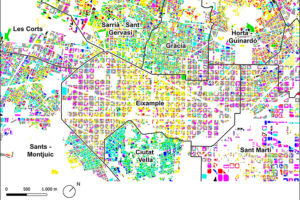
SARAS: Autonomous robotic arms with a cognitive system to assist surgeons in the operating room
October 24, 2022
Diskover. Towards a new tourism model: personalised, “slow” and quality
November 3, 2022The research centre Centre for Land Policy and Valuations (CER-CPSV) is participating in the X-ClimPlan project. The project aims to develop a tool that significantly improves the resilience of cities to extreme climate episodes.
The phenomenon of heat islands
The warming of the system is an undeniable fact: most of the world’s snow and ice have melted, the temperature of the atmosphere and of the oceans has risen and the sea level is continuing to rise.
The 30-year period 1983–2012 in the northern hemisphere is where these effects have been noted most. The temperature of the Mediterranean Sea is up to 1.5°C higher than before the pre-industrial levels. This shows that the warming is 20% faster than the average for the entire planet. Currently, the summer in Spain is five weeks longer than in the 1980s. Other visible effects are the total number of days of rainfall a year, which have dropped 30%. At the same time, the number of days with torrential rainfall and floods has increased 30%. Both effects have significant impacts on the environment, and on people’s health and economy. The most vulnerable are those with the lowest incomes.
Cities cause over 75% of greenhouse gas emissions and experience what are known as urban heat islands. In other words, they may have zones that are between 3 and 5°C hotter than surrounding areas.
X-ClimPlan: Building resilience for cities and regions
The general objective of the X-ClimPlan project is to study extreme weather events such as the heat waves, torrential rainfall and floods that have occurred on the Mediterranean coast in recent decades, and to evaluate their effects and propose a methodological tool for multi-scale analysis of the resilience of cities and regions.
Project results
The main impact of the project is the establishment of urban planning and design criteria that increase urban resilience to climate change, urban heat islands and extreme phenomena in urban and metropolitan systems of the Mediterranean coast.
It is important to expand the notion of sustainability to include awareness of climate change and its interaction with anthropic modification of the urban climate, and resilience to these changes. In this regard, urban planning and city management professionals should be urgently trained in the effects that global warming, added to the phenomenon of heat islands, have in the city and in the territory. The project proposes the introduction of climatic analysis in urban and territorial planning and climate renovation of neighbourhoods, based on the adaptation of public space. .
Nocturnal heat island in the Barcelona Metropolitan Area

This research proposal is associated with the United Nations Sustainable Development Goals and the Spanish Agenda 2030. The total budget, provided by the Spanish National Plan for Scientific and Technical Research and Innovation 2017–2020, was €108,900. The project’s duration was two years (June 2020 to July 2022).
Related Projects
- The La Volta project foresees the construction of a large Catalan vault pergola within the Llars Mundet campus, in the Montbau neighbourhood (Horta-Guinardó district). This structure will become a new architectural landmark for Barcelona, combining traditional construction techniques with contemporary innovation. The project involves the Rehabilitation and Architectural Restoration Research Group (REARQ), at the Universitat Politècnica de Catalunya - BarcelonaTech (UPC), and is led by the Architects’ Association of Catalonia (COAC) and the Barcelona Provincial Council.
- The Architecture, Energy and Environment (AiEM) research group at the Universitat Politècnica de Catalunya - BarcelonaTech (UPC) has characterised Barcelona’s residential buildings according to their capacity to adapt to climate change. This study is part of the project ‘VeUvE: Urban havens for vulnerable zones’. The work highlights the climate inequality conditions present across different areas of the city and will help to better define the priorities and energy renovation strategies for its districts.
- The Research Center for Supervision, Safety and Automatic Control (CS2AC-UPC) at the Universitat Politècnica de Catalunya - BarcelonaTech (UPC) has coordinated the SaCoAV project, focused on researching new methods and tools to ensure the safe coordination of autonomous vehicles in urban environments.
- The Centre for Technological Risk Studies (CERTEC) at UPC is participating in the WUITIPS project (Wildland-Urban-Interface Fire Touristic Infrastructure Protection Solutions), which aims to develop a new wildfire management framework for the tourism sector. This project contributes to risk analysis and the design of specific strategies to mitigate such risks.




